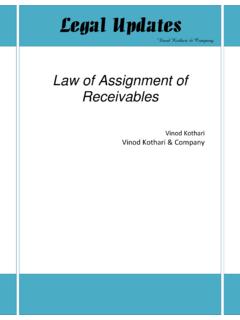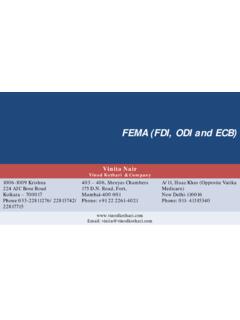Transcription of FAQs - Vinod Kothari Consultants
1 faqs faqs on appointment of independent directors Vinod Kothari Vinita Nair Updated June 10, 2014. Check at: for more write ups. Copyright: This write up is the property of Vinod Kothari & Company and no part of it can be copied, reproduced or distributed in any manner. Disclaimer: This write up is intended to initiate academic debate on a pertinent question. It is not intended to be a professional advice and should not be relied upon for real life facts. faqs on appointment of independent directors faqs The old mindset on appointment of directors appointment as additional director first, then regularisation in a general meeting, followed by retirement by rotation etc all of this will have to change completely in case of independent directors. The key point is Schedule IV, (1) (2) and (3). The language of the Schedule suggests that the appointment will have to be done by the general meeting. Seemingly the provisions of the Act, 2013 and the rules issued thereunder relating to appointment and qualification of directors and independent directors are creating a lot of confusion.
2 As a result Ministry of Corporate Affairs (MCA) on 9th June, 20141 has issued clarification on the same vide General Circular No. 14/2014. (clarification circular) after examining various representations received. In the light of the above-mentioned, the faqs below seek to answer some common questions: Criteria for independence: 1. Is there a difference in the criteria of independence as per clause 49, revised Clause 49 and as per section 149 (6) of the Act, 2013? Yes, the criteria of independence as per Clause 49 and that as per Section 149. (6) of the Companies Act, 2013 (Act) differs. In addition to those mentioned under section 149 (6) of the Act, Clause 49 lists out the following as well: Criteria under Old Cl. 49 Criteria under (6) of Criteria under revised Cl. 49. Act, 2013 (wef 1st Oct 2014). apart from receiving who has or had no pecuniary apart from receiving director's director's remuneration, does relationship with the remuneration, has or had no not have any material company, its holding, pecuniary relationship with pecuniary relationships or subsidiary or associate the company, its holding, transactions with the company, or their promoters, or subsidiary or associate company, its promoters, its directors, during the 2 company, or their promoters, or directors, its senior immediately preceding directors, during the 2.
3 Management or its holding financial years or during the immediately preceding company, its subsidiaries and current financial year; financial years or during the associates which may affect current financial year independence of the director - none of whose relatives has or none of whose relatives has or had pecuniary relationship or had pecuniary relationship or transaction with the company, transaction with the company, its holding, subsidiary or its holding, subsidiary or 1. The circular may be viewed at faqs on appointment of independent directors faqs Criteria under Old Cl. 49 Criteria under (6) of Criteria under revised Cl. 49. Act, 2013 (wef 1st Oct 2014). associate company, or their associate company, or their promoters, or directors, promoters, or directors, amounting to two per cent. or amounting to 2% or more of its more of its gross turnover or gross turnover or total income total income or Rs. lakh or Rs. lakh or such higher rupees or such higher amount amount as may be prescribed, as may be prescribed, whichever is lower, during the whichever is lower, during the two immediately preceding two immediately preceding financial years or during the financial years or during the current financial year.
4 Current financial year is not related to promoters or i) who is or was not a i) who is or was not a persons occupying promoter of the company or promoter of the company or management positions at the its holding, subsidiary or its holding, subsidiary or board level or at one level associate company; associate company;. below the board ii) who is not related to ii) who is not related to promoters or directors in promoters or directors in the the company, its holding, company, its holding, subsidiary or associate subsidiary or associate company company has not been an executive of the - - company in the immediately preceding three financial years is not a partner or an executive neither himself nor any of his who, neither himself nor any of or was not partner or an relatives his relatives . executive during the preceding i) holds or has held the three years, of any of the i) holds or has held the position of a key managerial following: position of a KMP or is or has personnel or is or has been i) the statutory audit firm or been employee of the employee of the company or the internal audit firm that is company or its holding, its holding, subsidiary or associated with the subsidiary or associate associate company in any of company, and company in any of the three the three financial years ii) the legal firm(s) and financial years immediately immediately preceding the consulting firm(s) that have preceding the financial year financial year in which he is a material association with in which he is proposed to proposed to be appointed.
5 The company be appointed; ii) is or has been an employee ii) is or has been an employee or proprietor or a partner, in or proprietor or a partner, in any of the three financial any of the three financial years immediately preceding years immediately preceding the financial year in which the financial year in which he is proposed to be faqs on appointment of independent directors faqs Criteria under Old Cl. 49 Criteria under (6) of Criteria under revised Cl. 49. Act, 2013 (wef 1st Oct 2014). he is proposed to be appointed, of . appointed, of . a. a firm of auditors or a. a firm of auditors or company secretaries in company secretaries in practice or cost auditors practice or cost auditors of the company or its of the company or its holding, subsidiary or holding, subsidiary or associate company; or associate company; or b. any legal or a consulting b. any legal or a consulting firm that has or had any firm that has or had any transaction with the transaction with the company, its holding, company, its holding, subsidiary or associate subsidiary or associate company amounting to company amounting to ten per cent.
6 Or more of ten per cent or more of the gross turnover of such the gross turnover of firm; such firm;. is not a material supplier, who, neither himself nor any of service provider or customer or his relatives is a material a lessor or lessee of the supplier, service provider or company, which may affect customer or a lessor or lessee of independence of the director the company is not a substantial shareholder who, neither himself nor any of who, neither himself nor any of of the company owning 2% his relatives; his relatives;. or more of the block of voting shares holds together with his holds together with his relatives relatives 2 per cent. or more of 2 per cent. or more of the total the total voting power of the voting power of the company;. company;. not less than 21 years of age Who is less than 21 years of age. This seems to be a drafting lacuna. who, in the opinion of the who, in the opinion of the Board, Board, is a person of integrity is a person of integrity and and possesses relevant possesses relevant expertise expertise and experience and experience.
7 Who, neither himself nor any of who, neither himself nor any of his relatives; his relatives;. is a Chief Executive or director, is a Chief Executive or director, faqs on appointment of independent directors faqs Criteria under Old Cl. 49 Criteria under (6) of Criteria under revised Cl. 49. Act, 2013 (wef 1st Oct 2014). by whatever name called, of any by whatever name called, of any non-profit organisation that non-profit organisation that receives 25% or more of its receives 25% more of its receipts from the company, any receipts from the company, any of its promoters, directors or its of its promoters, directors or its holding, subsidiary or associate holding, subsidiary or associate company or that holds 2% or company or that holds 2% or more of the total voting power more of the total voting power of the company of the company It is to be noted that for the purpose of the Companies Act, 2013, associate company , means a company in which that other company has a control of at least 20% of the total share capital2 or of business decisions under an agreement, but which is not a subsidiary company of the company having such influence and includes a joint venture company.
8 However, for the purpose of Clause 49, the meaning of the word associate is derived from AS 23, and which means an enterprise in which the investor can participate in the financial and/ or operating policy decisions of the investee but cannot control those policies and which is neither a subsidiary nor a joint venture of the investor. 2. How does a director self certify and intimate his independence to the company? At what point of time does this need to be done? An independent director shall self certify that he satisfies the criteria laid down under section 149 (6) of the Act, 2013 at the following points of time: at the first board meeting in which he participates as a director at the first board meeting in every financial year whenever there is a change in the circumstances which may affect his status as an independent director 3. Is there any particular form for self certification of independence? No, there is no particular format for self certification of independence. He may make a declaration in the format given in the Annexure 2.
9 Means the aggregate of the - (a) paid-up equity share capital; and (b) convertible preference share capital;. faqs on appointment of independent directors faqs 4. How should one determine the existence of a pecuniary relationship? The language in section 149 (6) (c) uses the word pecuniary relationship , while in section 149 (6) (d), the words used are pecuniary relationship or transaction . The word material which featured in clause 49 of the listing agreement has not been included here. Further clause (d) specifies the monetary limit beyond which the value of the transaction will be seen as impacting the independence of the director. The intent of the law is not to bring each transaction of the independent director under the scanner. So long as the transactions are executed on arms length basis, it should not be regarded as a disqualification. MCA has also specified the same in its clarification circular that transactions entered into in the ordinary course of business at arm's length price will not fall under the purview of pecuniary relationship stated in section 149 (6) (c).
10 While determining the independence of the director. Further, the remuneration received from one or more companies, by way of a fee u/s 197 (5), reimbursement of expenses for participation in the Board and other meetings, profit related commission approved by the members in accordance with the provisions of the Act, 2013 will also fall outside the purview pecuniary relationship stated in section 149 (6) (c) while determining the independence of the director Tenure of an Independent Director 5. What will be tenure of appointment of independent directors? As per sub-sections (10) and (11) of section 149 of the Act, 2013 an independent director can be appointed for a term up to five consecutive years and thereafter can be re-appointed for another term of up to five consecutive years only after passing of a special resolution in general meeting. The re- appointment shall happen only after performance evaluation is done by the entire board. However, an independent director cannot hold office cannot for more than two consecutive terms.










